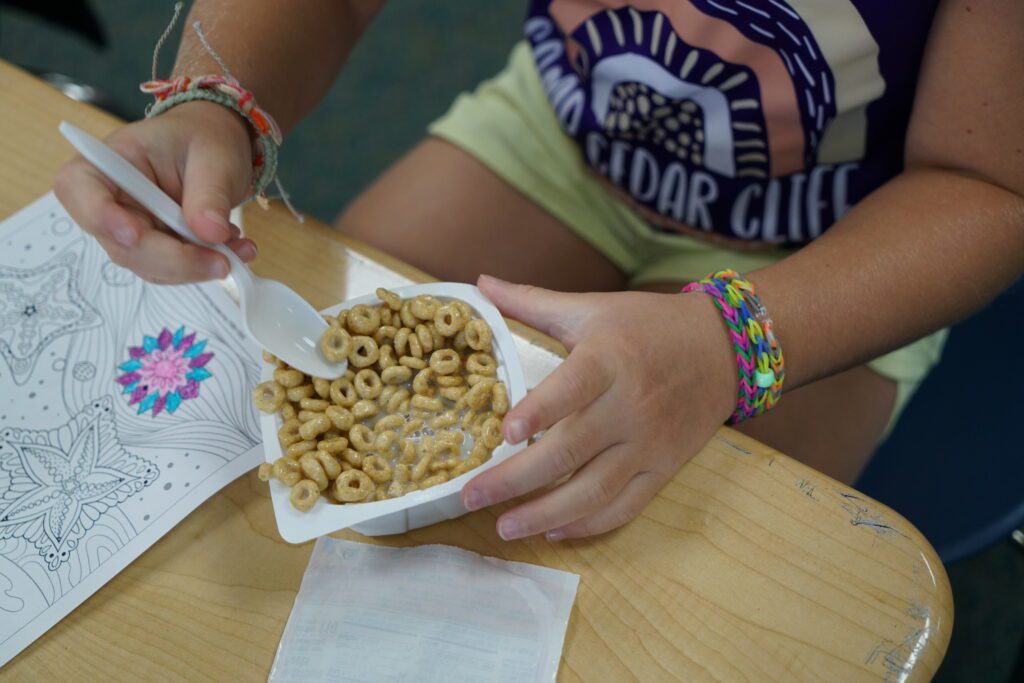

Share this story
- “I can't imagine not having a universal free breakfast and doing breakfast in the classroom,” said Kim Cullipher, nutrition director for Perquimans County Schools.
- What's a "tastecation?" Kim Cullipher, nutrition director for Perquimans County Schools, explains how she uses a combination of global inspiration and local food sourcing to inspire students to participate in school meals.
|
|
Kim Cullipher’s day typically starts between 4:30 and 5:30 a.m. The exact timing and location of her work day varies, depending on which cafeteria needs support. Her day officially ends on-site around 5:00 p.m., but she typically finishes up her duties remotely. The timing and tasks of her day may change, but her purpose remains the same – feeding kids.
As the nutrition director for Perquimans County Schools, Cullipher manages the operations of a team that is responsible for feeding up to 1,600 students on a daily basis. There are four public schools in Perquimans County, and her work often takes her to each, sometimes on the same day.
Cullipher started her role as nutrition director one week before the COVID-19 pandemic closed schools in March 2020. She was able to pivot her department quickly and ensured that meals were still offered to students via school bus delivery and curbside pickup.
Now, she continues to utilize creativity to make engaging and tasty menus that encourage more students to eat meals at school.
So far, her approach seems to be working.
“I want to create foodies, but also more than anything want to make sure that kids are not hungry,” Cullipher said. “That is our purpose.”
Closing the gap
The district is closing the breakfast gap, which is defined by the number of students that eat free-and-reduced price (FRP) school lunch but do not eat breakfast at school.
Across the state, the average number of FRP-eligible children that eat breakfast at school is 62 of 100, according to data from the Carolina Hunger Initiative. For Perquimans County Schools, it is 84 of 100.


Cullipher has several ideas about how they have closed the breakfast meal participation gap so quickly. For one, Perquimans County Schools has universal free breakfast. In late August, the Perquimans County Schools Board of Education voted to offer both breakfast and lunch free for all students during the 2023-24 school year.
They also serve breakfast in the classroom. Students go straight to their classrooms and breakfast is waiting for them, without having to make the trip to the cafeteria.
“I can’t imagine not having a universal free breakfast and doing breakfast in the classroom,” Cullipher said.
The combination of the meal being free and the convenience factor of serving it in the classroom has increased the amount of students participating in the breakfast program, she said.
Foodies with a purpose
Cullipher is motivated by the fact that there are students in her county that suffer from food insecurity. She knows that many of her students eat their biggest, and sometimes most nutritious, meals at school. To put it in numbers, as of 2021, Feeding America estimated that the child food insecurity rate in Perquimans County is 17.4% — almost one in every five children.
Feeding kids is the goal, but Cullipher takes her job a step further by doing her best to give the students a meaningful meal. She wants the students and her staff to be “excited about food,” and she aspires to that goal in a variety of ways.
“A hungry child deserves the absolute best, most nutritious, delicious meal,” Cullipher said.


Each year she incorporates “tastecations,” where every day of the week features food from a different country. Last year, she took her team to the state fair to try new North Carolina products. She also works with a local chef to train her staff so they can learn relevant skills and keep up with food trends.
“I give all my credit to my team. They really take a lot of pride in their work,” Cullipher said. “So I create menus, but they are the ones making them happen.”





